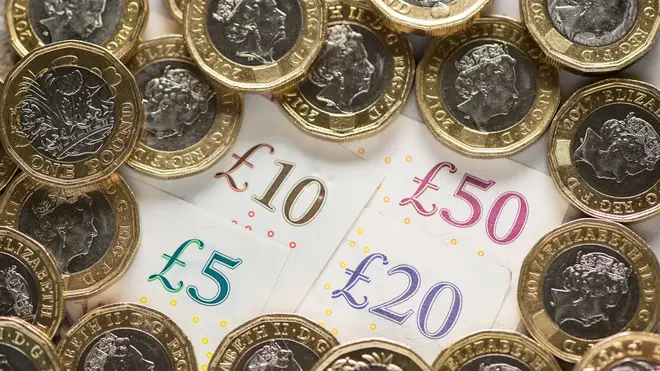
Oli Dugmore 4am - 7am
23 April 2021, 07:14 | Updated: 23 April 2021, 08:06

Government borrowing hit £303.1 billion in the year ending March, or 14.5 per cent of gross domestic product (GDP), the highest level since the end of the Second World War.
The Office for National Statistics said that public sector net borrowing - the government's deficit - reached £303.1 billion in the financial year to the end of March, up from £57 billion the previous year.
This was 14.5 percent of gross domestic product (GDP), the highest level since 1946, when the deficit hit 15.2 percent of GDP.
This is significantly larger than the deficit after the 2008 financial crisis, which hit around 10 percent of GDP.
Read more: Travel restrictions for passengers entering UK from India as country added to red list
Read more: Call for inquiry into Boris Johnson’s conduct over ‘cronyism’ rejected
The huge deficit has also pushed public sector net debt up to £2,141.7 billion, which is 97.7 percent of GDP - the biggest proportion since the early 1960s.

Rishi Sunak outlines how coronavirus has affected the economy
The sharp rise in borrowing has come as the government has taken unprecedented action to prop up the economy as lockdowns forced the closures of many sectors.
The furlough scheme alone has cost the taxpayer around £58 billion so far, while the NHS Test and Trace system is expected to cost £38 billion across 2020-21.
In March, the Chancellor Rishi Sunak warned that it would be the work of many governments across many decades to pay off the debt.
Announcing a freeze on income tax bands and a rise in corporation tax to attempt to pay back the money, he added: "Just as it would be irresponsible to withdraw support too soon, it would also be irresponsible to allow our future borrowing and debt to rise unchecked. When crises come, we need to be able to act."
Read more: Extinction Rebellion activists tip 'coal' outside Lloyds of London insurance market

Archbishop of Westminster condemns Govt's foreign aid
Foreign aid has also controversially been cut by up to £4 billion - from 0.7 percent of national income to 0.5 percent - prompting campaigners to accuse the government of having “lost its moral compass”.
On Thursday, Senior Tory MP Sir Roger Gale told LBC the "disgraceful decision" to reduce foreign aid came "at the very moment countries need the help most".
"We can afford this...we will recover," he said, "if anything we should be increasing it."
Read more: Joe Biden urges world leaders to ‘step up’ as he vows to halve US emissions

Senior Tory MP brands PM's foreign aid cuts 'abhorrent'
Commenting on the latest ONS borrowing figures, KPMG senior economist Michal Stelmach said: "Rising debt is largely an unfortunate consequence of the government's focus on shielding the economy as much as possible from the impact of Covid-19.
"However, doing otherwise could have created long-lasting scars which would be far worse for fiscal sustainability."
Mr Stelmach said that while borrowing has so far risen to pay for increased spending, the government is likely to need to borrow to make up for a shortfall in the tax it collects this year.
Read more: Covid-19 crisis in numbers
In the year to the end of March, the amount of tax collected by the government dropped by £34.2 billion to £523.6 billion, the ONS said.
It put the drop down to a fall in the amount of VAT, business rates and fuel duty collected.